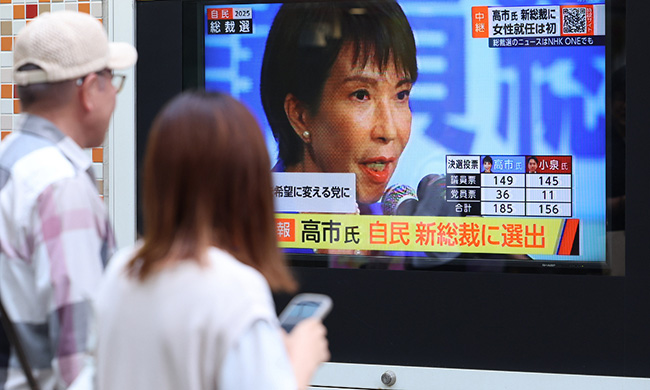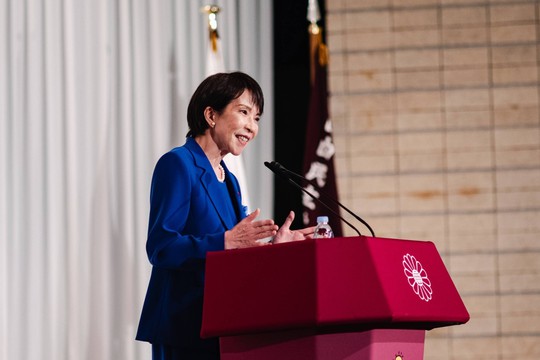Sanae Takaichi, the newly elected leader of the ruling Liberal Democratic Party, holds a news conference after the LDP presidential election in Tokyo.
Photo: ‘Japan Times’
Takaichi earned 185 votes against Koizumi’s 156 in a runoff after none of the five candidates in the party leadership race secured a majority in the first round of voting, ‘Japan Times’ reports.
Takaichi gained 149 lawmaker votes and 36 LDP chapter votes, topping Koizumi’s 145 votes from lawmakers and 11 from the prefectural chapters. It was her third bid for the party leadership.
“I’m feeling how tough it’s going to be from here on, rather than feeling happy,” Takaichi said after her election.
“We won’t be able to rebuild the party if I don’t get everyone’s help, from all generations,” she added. “I will scrap my work-life balance and work and work and work and work and work.”
At a news conference later in the evening, Takaichi touched on the possibility of expanding the ruling coalition, saying that a new partner would need to agree with the LDP on fundamental issues, including constitutional revision, diplomacy and fiscal policy.
An extraordinary session of the Diet — as Japan’s parliament is formally known — to elect a prime minister is expected to be convened in mid-October.
The new president has a number of daunting tasks ahead of her as she seeks to rebuild the party while leading a minority government in both the Lower and Upper houses.
Her first challenge will be to unite the divided party. Her picks for the LDP executive lineup will be key, with all eyes on whether she will include her election rivals and their supporters among those choices.
She will serve the remainder of Prime Minister Shigeru Ishiba’s three-year term through September 2027.
Once she is elected prime minister, Takaichi will be facing a parliament in which the LDP-Komeito coalition will need the opposition's cooperation to pass legislation.
She will also need to quickly get up to speed on the diplomatic front, with Tokyo and Washington coordinating a possible bilateral meeting between the new prime minister and U.S. President Donald Trump for later this month.
A 64-year-old Lower House lawmaker representing Nara’s No. 2 constituency, Takaichi has over 30 years of experience in parliament.
A protege of late former Prime Minister Shinzo Abe, she has served in several key portfolios both within the party — as policy chief and general affairs council chair — and in the Cabinet.
From 2022 to 2024, she was Japan’s economic security minister. She also holds the record as the longest-serving minister for internal affairs, a post she held in several stints.
Takaichi has long been the poster child of the LDP’s conservative wing — championing causes such as high government spending, a hawkish approach to China and a large defense budget.
“I don’t want to be pigeonholed just as a conservative, I’m more of a moderate conservative now that all these parties have come out,” Takaichi said last month, making apparent references to parties such as Sanseito and the Conservative Party of Japan, which she did not name.
Takaichi also called China an “important neighbor” and emphasized the importance of strengthening bilateral relations.
After Saturday’s vote, former Justice Minister Midori Matsushima, one of the 20 lawmakers who endorsed Takaichi in the election, beamed at the prospect of a first female prime minister.
“The first female prime minister is born,” Matsushima said. “I’m so happy that I could witness this. I hope this gives courage to many young women, and to the people like her, who were not born into a family of politicians, who were born and raised in a place that had nothing to do with politics."
Leaders of opposition parties that might look to join an expanded coalition expressed a willingness to hold talks with the ruling party under Takaichi.
 A news program on TV reports that Sanae Takaichi, Japan’s former internal affairs minister, won the Liberal Democratic Party's presidential election.
A news program on TV reports that Sanae Takaichi, Japan’s former internal affairs minister, won the Liberal Democratic Party's presidential election.
Photo: CFP
Takaichi’s election as LDP president, putting her on course to become Japan’s first female prime minister, marks a historic break from political tradition and underscores the party’s bid to reinvent itself amid crisis. As Takaichi is a leading figure of Japan’s right-wing conservatives, her leadership is expected to bear strong nationalist and conservative tones, Xiang Haoyu, a distinguished research fellow at the Department for Asia-Pacific Studies of the China Institute of International Studies, told ‘The Global Times” on Saturday.
Takaichi champions traditional Japanese values, backing aggressive fiscal and monetary stimulus to spur growth and bolster economic security. In foreign and security policy, she takes a hardline stance—pushing constitutional revision, military buildup, and exclusionary policies, said the expert.
Xiang also noted that the new LDP president is highly likely to become Japan’s next prime minister. Despite lacking a majority, the LDP remains the largest party, and the opposition’s disunity makes it unlikely to rally behind a single candidate.
Still, the incoming leader faces steep challenges. As head of a “double-minority government,” lacking control of both houses, she must push political reform, maintain party unity, and lift sagging support rates—all while struggling to pass legislation. To survive, the new administration will need to compromise with the opposition and may even consider forming a broader coalition, leaving Japan’s political trajectory highly uncertain, said the expert.
A Kyodo News report noted that former internal affairs minister Takaichi, is known to be a staunch conservative and a policy expert. The report also noted that Takaichi, known for her close ties with former Prime Minister Shinzo Abe, has advocated amending the Constitution so Japan can possess "national defense forces."
It said that known as an admirer of former British Prime Minister Margaret Thatcher, she has held key posts in the LDP and the Cabinet, including the head of the party's Policy Research Council and state minister in charge of Okinawa and Northern Territories issues and Japan's falling birthrate.
A Kyodo News report noted that Takaichi has faced criticism in the past from neighboring countries for her frequent visits to Yasukuni shrine, a war-linked shrine in Tokyo seen by the neighboring countries as a symbol of Japan's past militarism.
Japanese politics often sees leaders adjust their stance once in office. Takaichi’s approach may evolve once she takes the helm. It is too early to predict her course, but any Japanese leader will inevitably have to weigh the international environment, with relations with China remaining central to Japan’s strategic interests, said the expert.
read more in our Telegram-channel https://t.me/The_International_Affairs

 11:10 05.10.2025 •
11:10 05.10.2025 •























